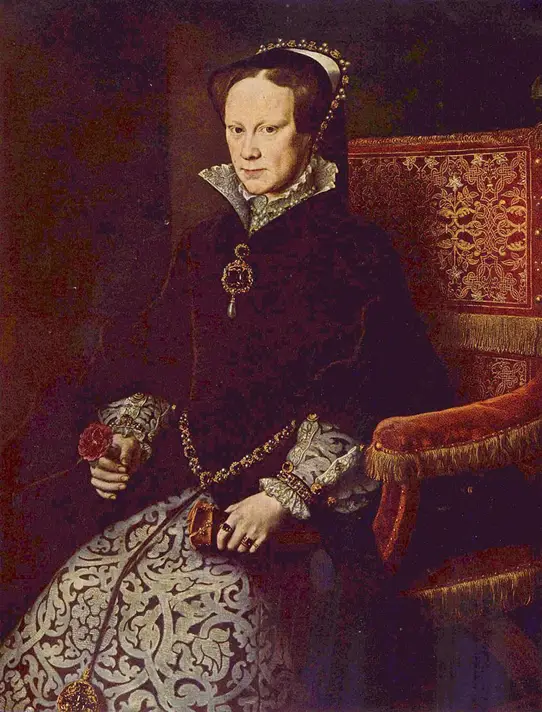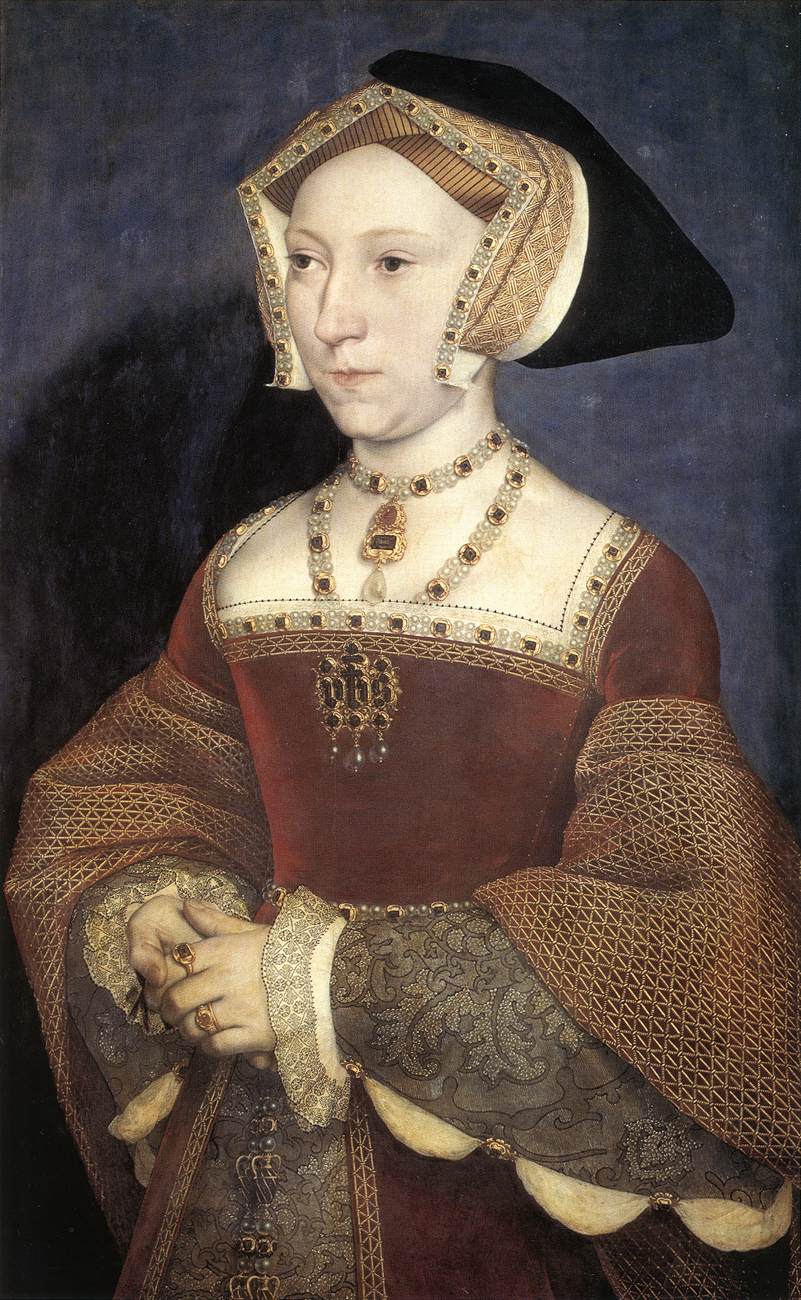December 14
Christmas in the time of Jane Seymour and Mary Tudor
By Judith Arnopp

Few would argue with the fact that Mary Tudor had a traumatic upbringing. For the first few years she was her father’s ‘pearl’, the perfect princess. However, Henry VIII’s struggle to be free of Catherine of Aragon saw Mary stripped of her royal title, separated from her mother, exiled from court, and forced to serve in the household of her younger sister, Elizabeth.
The years of Anne’s reign were tough for Mary and 1536 was an eventful one for Henry. He suffered a fall from his horse, the shock of which is believed to have caused Anne to miscarry. His first wife’s death was quickly followed by the fall of his second, and his third marriage to Jane Seymour took place very shortly afterwards. We seldom take time to consider the psychological impact this may have had on both Henry and Mary – three queens dead in less than two years. Both the king and his daughters had plenty of misery to come so it is comforting to think of Henry, Jane and Mary enjoying the brief respite of a merry Christmas.
The winter of 1536-7 was a cold one, the country was ice-locked and the roads impassable but the new queen, Jane Seymour, entreated the king to invite Princess Mary for the Christmas celebration. It would not have been wise to refuse but even if she’d dared, by this time Mary was yearning for the acceptance of her father whom she’d not seen for about five years.
Mary’s return to the king’s favour was not freely given and Henry insisted she publically accept both her illegitimacy, and Henry as the head of the church in England. Faced with little option, Mary at last gave in to the king’s demands but secretly wrote to the Pope to request absolution.
The Thames was frozen solid but the king was undeterred and, on the twenty-second of December, the royal party travelled on the frozen river from Westminster to Greenwich. Christmas that year would provide pleasant memories for Mary as she grew older and her life became more difficult but for Jane, had she lived, Christmas 1536 would always have marked a time of sadness.
The festivities were spoiled for the queen by news of her father, Sir John Seymour’s death at Wulfhall on the 21st of December. Since he had never been a member of the court there was no official court mourning. I can imagine her dutifully ‘enjoying’ the antics of fools, the mummer’s plays, the lords of misrule, and indulging in the festive feast while all the time concealing her grief from the king and court.
As for Henry, it is just as well that he made the most of the festivities for by the following October, after giving him his longed for son, Jane was dead but Henry at least had his heir. Despite the birth of Edward, for a while Henry was a broken man and spent Christmas 1537 immersed in grief.
The excerpts below from two of my novels illustrate the contrast between the king’s Christmas in 1536 and that of the deposed and homeless monks and nuns on the Pilgrimage of Grace.
![]()
An excerpt from The Heretic Wind: the story of Mary Tudor

The lengthy service at St Paul’s marks the beginnings of the festivities and Father dispenses with solemnity as soon as we leave the church. With the crowd’s appreciative roar in our ears, we travel toward the Thames that has become a wide, white serpent of ice that is so thick we are able to ride across to the opposite shore. Clinging to the saddle, I laugh aloud as my horse’s hooves slip and slide. We struggle up the sloping bank, and my cheeks are stung by the biting wind as I follow father’s broad back to Greenwich Palace.
Darkness is falling as we arrive, the lighted windows blaze warming the winter gloom, promising gaiety and mulled wine. Grooms come running as we climb stiffly from the saddle in the frozen yard.
“Brrrr!” Father claps his hands together and stamps his feet, his misting breath floating like a dragon’s around his head.
“Come ladies,” he cries, holding out his elbows. Jane takes his right and I his left arm, and together we mount the steps to the great hall.
A blast of welcoming trumpets, a blaze of torches that makes me squint after the dark outside. The warmth of the hall is smothering after the bitter chill outside. An excited company greets us. Someone removes my cloak and I turn to thank them but as I do I notice the queen accepting a letter from a messenger. She frowns and excusing herself from the company, slips from the hall. After a few moments, in which I noticed that father has not seen the exchange, I follow after her. I find her in an ante-chamber; she is seated at a table, weeping quietly. When she hears my footstep, she jumps and is visibly relieved to discover it is only me. She tucks the letter into her pocket and dabs at her eyes with her kerchief. Surely she does not have a sweetheart.
I frown, turn my head questioningly, and raise my eyebrows.
“What ails you, dear Jane?”
“Oh Mary.” She dries her eyes but they quickly well with tears again. Her attempt at a brave smile fails.
“You can confide in me, Jane. Anything … I can keep a secret.”
“It isn’t a secret. It is a letter from home; my father …” She clears her throat and forces her voice not to quaver. “It seems he was taken from us … yesterday. I – I hadn’t even been informed he was ill.”
As difficult as he can be, I cannot imagine losing my father. With a smothered mew of sympathy, I slide to the floor at her knee and take her hands in mine. Her knuckles are red, chafed by the winter cold.
“Oh Jane! Shall I fetch the king? The celebrations must be cancelled. I will go and find him now…”
I attempt to rise but she detains me.
“No. Please, Mary. Let there be no fuss. My father was not a figure of the court and I would hate to spoil the King’s enjoyment. He has been looking forward to the festivities and has had such trouble of late. I will inform him this evening, when we are alone. His pleasure in the season must not be marred.”
She wipes her eyes, tucks her kerchief back inside her sleeve and smiles determinedly. “There, how do I look?” It is only when I look carefully that I can detect she is concealing something.
So, I think, Jane does know how to dissemble.
![]()
There was another guest at the Christmas court of 1536. In response to the dissolution of the monasteries, the north of the country was in rebellion. The rebels from Lincolnshire, Yorkshire and beyond far outnumbered the king’s army so Henry, whilst pretending to consider their demands, invited their leader, Robert Aske, to join the court celebration.
Aske was a lawyer, with the reputation as a radical, and a man with strong Catholic roots. He was unused to royal hospitality and Henry treated him splendidly during his first and last visit to the court, even going so far as to bestow on him a velvet coat. Aske was plied with food and drink, enjoyed the extravagant entertainments but all the while the king was watching him, and wondering.
A few months later, when protest broke out afresh in the north, despite having no involvement, Aske was in trouble again. Although Aske offered to help the king quell the rising, Cromwell (who was the prime target of the rebels) went out of his way to implicate him in the rebellion. In July 1537, after a short and unjust trial, Aske was condemned to die a traitor’s death and hung alive in chains over the walls of Clifford’s Tower in York.
![]()
Excerpt from Sisters of Arden – the nuns have been on the road for some time and are weary and distressed at the punishment of their leader.
December 1536 – York
The road to York holds no joy for me. I am weary of trudging about the countryside and long for the unchanging days of Arden. To think I once found the thought of the outside world fascinating. I would give anything to live those dull, predictable days again. Yet it is well that we have returned to the small comfort of York, for the roads have grown treacherous in the increasing cold. Even when crossing the market square my ankles turn on the frozen mud, so I am forced to take small steps, hobbling like a crone.
I have taken to leaving Andrew with Frances at the hearthside while I venture out to find a few scraps of food. She is heavy with a head cold and I know Andrew will soon be likewise, yet I struggle to find the nourishment they need. I never imagined the world could be as cold or as hard as this.
In the Minster, Archbishop Lee preaches of the virtues of obedience and we shiver as we listen stone-hearted in the bone-chilling nave. It is too late for obedience. We cannot change what we have done, we can only wait and hope, and pray for the king’s mercy.
Nobody imagined we’d have to wait so long for the pardon; most of us thought we’d be safe home by Christmas, but winter has settled on us hard and still there is no news. The hills beyond the city are white, the skies black and heavy with further snow to come. While the rich folk feast at their warm firesides, the dispossessed perish in the deserted streets. Each day, the Minster fills with people seeking the pity of the church, and the paltry heat of the braziers.
When darkness falls, the cold increases, and our thin blankets do nothing to warm us. We huddle together with Andrew between me and Frances, while Grace clings to my back; but still we shiver.
“Where John?” Frances asks at every fifth heartbeat, and soon I am so weary of the question that I block out her voice. During the darkest, most miserable part of the night, I fear for our survival. I would not be surprised to wake to find Andrew stiff in my arms, or Frances covered in a blanket of frost.
When John seeks us out in the morning, Frances is still sleeping, and we are able to question him without interruption. I see straight away that something has changed. Keeping my eyes turned from him, I nudge Grace to alert her to his presence.
“You have news,” she says, moving toward him. “Has the king made up his mind?”
John shakes his head.
“Nay, but he has invited Aske to court for Christmas.”
Grace exchanges glances with me. I shrug my shoulders, at a loss to understand what this might mean. What are we to do while our leader enjoys the high life? How shall we survive while he grows fat at the king’s expense?
I sigh and frown, wishing – not for the first time – that I’d never come. I should have left the fate of the country in the hands of other, stronger folk. Why did I not wait for the king’s men to leave Arden and find a way to creep back inside? I cling to the old ways.
“What will Aske going to court serve? Why – what – do you think he has a chance of changing the king’s mind?” Grace kneels at the hearth, poking the small flame with a burnt stick.
“I don’t know. I expect they will discuss terms … conversation is often more productive than letters passed back and forth.”
Discussing terms while dining on roast swan and honeyed wafers! It makes me uneasy and I am grateful when Grace asks the question I long to voice.
“Can we trust the king? Can we be sure there is not some … other plan?”
While my belly rolls at the thought of the king’s dinner, Grace scowls at John, who holds out his palms toward the fire.
“You can’t be sure of anything when it comes to the king. We can only hope that Aske has the skill to help him see the error of his ways.”
And then what? I ask myself. What will become of us all? I want to go home. I want things to be as they were before. I want to hear the rough tongue of Sister Dorothea, feel the lash of the prioress’ girdle on my palm, the damp dark comfort of the dormitory, the stench of the barnyard, the freedom of the fragrant springtime hills.
Frustration bursts from me in a cry. I bury my face in my hands, forcing back the urge to scream. There is nothing to be done but wait; shouting into the wind won’t help at all.
Trapped in winter’s frozen fingers, we wait a few weeks longer until, eventually, word filters to us that not just Yorkshire but the whole of England is covered in ice. In London, King Henry and Queen Jane travel on horseback from Whitehall to Greenwich, beside the frozen River Thames. I have no way of knowing how far that is but those around me exclaim over it, so I imagine it is distant.
We also learn that the king has made Aske the gift of a crimson coat, and I expect everyone at court is clad in furs and velvets. Here, on the pilgrimage, we wear the same threadbare habits we’ve been wearing for months. No doubt the king’s daughters are well nourished and warm, not like my Andrew, who has become a skeletal starveling. We should never have left Arden … we should have stayed at home.
![]()
Judith is the author of historical fiction set in the Tudor period covering the lives of prominent Tudor women.
You can see Judith's books here: http://viewauthor.at/judith_arnopp
Judith's website: www.judithmarnopp.com
